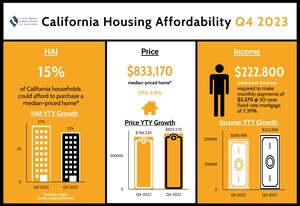LOS ANGELES, June 19, 2017 /PRNewswire-USNewswire/ -- California will lose generations of potential homeowners through 2030 unless it creates a more abundant housing supply, contends one of a compilation of articles issued through the Center for California Real Estate (CCRE), an institute of the CALIFORNIA ASSOCIATION OF REALTORS®.
The Journal, produced by CCRE, includes eight articles authored by economists with diverse perspectives from across America who address a variety of issues relative to the challenges facing potential homeowners and the long-term implications associated with inaction to increase access to market rate housing.
"These are not just 'today' issues. If we don't address the problems we have right now, the lack of affordable, available housing will be a 15-20-year problem that will sentence our children and grandchildren to a life without the ability to own their own home," said Geoff McIntosh, President of the CALIFORNIA ASSOCIATION OF REALTORS®. "The Center for California Real Estate continues to engage thought leaders on important housing issues so that federal, state, and local lawmakers can use the information to take action. If we fail to address our current homeownership crisis, we're hurting people and tarnishing our Golden State's promise."
Journal Highlights
California Homeownership in 2030 and Beyond: Demographic Change and the "Lost Generations" of Homeowners, states "the homeownership rate in California has trailed the rest of the U.S. by about 10 percentage points for decades. Detailed demographic projections suggest the "California homeownership gap" is likely to remain stable until at least 2030, even as homeownership rates drift down in California and nationwide." Authors: William R. Emmons, Lead Economist, Center for Household Financial Stability, Federal Reserve Bank of St. Louis, and Lowell R. Ricketts, Lead Analyst, Center for Household Financial Stability.
Can Americans Rebuild Their Assets if Asset-building is no longer a political priority? – this report explores the socio-economic impact, changing demographics, and federal programs that enhance homeownership and their impact on the state's housing market. Author: Doug Ryan, Director of Affordable Homeownership, Corporation for Enterprise Development (CFED).
Inequality, Mobility and the State of the American Dream delves into income stagnation, growing wealth gaps, changing labor markets, and the complexities of globalization. Author: Kevin T. Leicht, Professor of Sociology, University of Illinois at Urbana-Champaign.
The Evidence of Homeownership Education and Counseling explores the benefits of pre- and post-purchase education and counseling for homebuyers and current homeowners. Gaining additional knowledge has shown to assist borrowers in avoiding financial pitfalls and help make smart purchasing decisions. Author: Research Utilization Division, Office of Policy Development, United States Department of Housing and Urban Development.
Learning to Achieve the American Dream examines the direct relationship between higher education and homeownership. Educational attainment is strongly correlated with income, as more education often leads to higher income, which leads to increased likelihood of owning a home. Author: Mark Fleming, Chief Economist, First American financial Corporation.
Rebuilding Pathways to Homeownership lays out policy priorities for millennials and the middle class. The paper is a "call to action" for policies to help families strengthen their financial position to better prepare for homeownership. This includes increased incomes, saving for a down payment and repairing credit scores – all of which can limit the risk of future loan defaults. Author: Reid Cramer, Senior Fellow, New America.
Maryland Smart Buy Program details an innovative new packaged loan program tailored for homebuyers with student loans. The program mitigates new requirements to use student loan repayment obligations as a reduction in a homebuyer's ability to qualify for a higher mortgage loan. It is an example of creative thinking that may help keep California college graduates from fleeing the state after earning a diploma. Author: Sergei Kuzmenchuk, Chief Financial Officer, Maryland Department of housing and Community Development.
Fostering Growth and Opportunity in California for a Strong Middle Class offers five goals state policymakers should focus on to improve housing supply and expand access: Investment in transportation and water infrastructure; easing regulatory and zoning burdens; make energy more affordable, update labor laws and reduce litigation, and invest in education and a skilled workforce. Author: Loren Kaye, President, California Foundation for Commerce and Education.
View the Journal online here in its entirety or for a hard copy, please contact [email protected].
Desk Editors and Producers: Interview requests can be made by contacting Mike Marando at (916) 448-5802 or via email at [email protected].
About the Center for California Real Estate (CCRE):
CCRE is an institute from the CALIFORNIA ASSOCIATION OF REALTORS® dedicated to intellectual engagement in the field of real estate. Its mission is to advance industry knowledge and innovation with an emphasis on convening key experts and influence-makers. For more information, please visit: centerforcaliforniarealestate.org.
About the CALIFORNIA ASSOCIATION OF REALTORS:
Leading the way® in California real estate for more than 100 years, the CALIFORNIA ASSOCIATION OF REALTORS® (www.car.org) is one of the largest state trade organizations in the United States with more than 190,000 members dedicated to the advancement of professionalism in real estate. C.A.R. is headquartered in Los Angeles.
SOURCE CALIFORNIA ASSOCIATION OF REALTORS
Related Links
WANT YOUR COMPANY'S NEWS FEATURED ON PRNEWSWIRE.COM?
Newsrooms &
Influencers
Digital Media
Outlets
Journalists
Opted In






Share this article